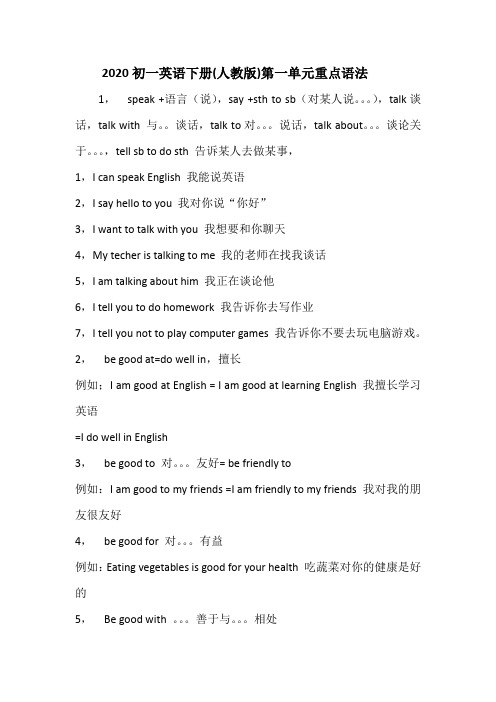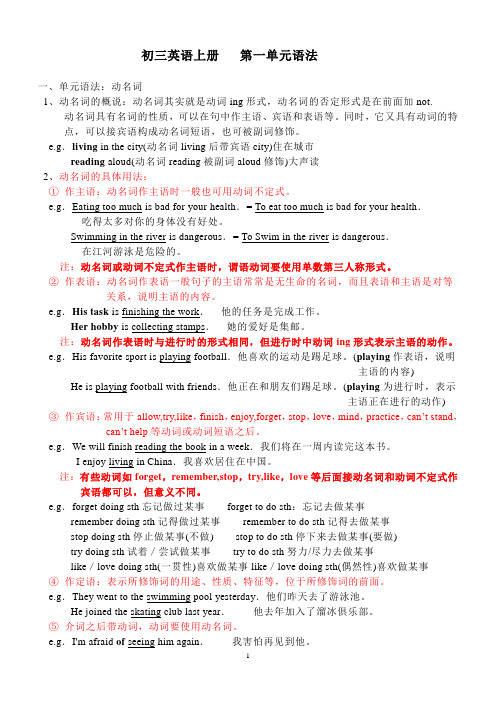第一单元重点语法
人教版九年级上册第一单元语法知识点

人教版九年级上册第一单元语法知识点
Unit1:Howcanwebecomegood1earners?
第一单元的语法重点是:"by+V-ing”结构详解;提建议的句式。
by+V-ing:
★“by+V-ing”结构在句子中作方式状语,常用来表示“以、靠、借助、通过、用(某种方法或手段)”而达到某种预期的目的。
该结构常用来回答Howdoyou...?之类的问题。
★当by和表示交通工具的名词连用时,它与名词之间不用任何限定词,且名词用单数形式。
Theyoftengotoschoo1bySUbWay.他们经常坐地铁上学。
★by,in和With都可以表示“通过;借助by后接表示动作、行为的名词;in表示“用某种语言;用某种材料”;Mth后接表示物体或工具的名词。
如:YoumaysendthebookbyPoSt.你可以通过邮局把书寄出去。
提建议句式:
①What/howabout+doingsth.?
如:What/Howaboutgoingshopping?
②Whydon,tyou+dosth.?
如:Whydon,tyougoshopping?
③Whynot+dosth.?
如:Whynotgoshopping?
(4)1et,s+dosth.
如:1et,sgoshopping
⑤ShaI1we/I+dosth.?
如:Sha11we/Igoshopping?。
2020初一英语下册(人教版)第一单元重点语法

2020初一英语下册(人教版)第一单元重点语法1,speak +语言(说),say +sth to sb(对某人说。
),talk谈话,talk with 与。
谈话,talk to对。
说话,talk about。
谈论关于。
,tell sb to do sth 告诉某人去做某事,1,I can speak English 我能说英语2,I say hello to you 我对你说“你好”3,I want to talk with you 我想要和你聊天4,My techer is talking to me 我的老师在找我谈话5,I am talking about him 我正在谈论他6,I tell you to do homework 我告诉你去写作业7,I tell you not to play computer games 我告诉你不要去玩电脑游戏。
2,be good at=do well in,擅长例如;I am good at English = I am good at learning English 我擅长学习英语=I do well in English3,be good to 对。
友好= be friendly to例如:I am good to my friends =I am friendly to my friends 我对我的朋友很友好4,be good for 对。
有益例如:Eating vegetables is good for your health 吃蔬菜对你的健康是好的5,Be good with 。
善于与。
相处例如:I am good with kids 我擅长与孩子相处6,write to sb 写信给某人I am writing to my brother 我正在写信给我的兄弟7,either(否定句尾),too(肯定句尾),also(句中)的区别,也I don’t like apples ,either 我也不喜欢苹果I like apples ,too 我也喜欢苹果I also like apples 我也喜欢苹果8,make friends with sb 与。
第一单元的重点单词,短语,句型,语法

Unit1 How tall are you?一、重点单词。
tall—taller更高的 short—shorter更矮的long—longer更长的old—older年龄更大的young—younger更年轻的 strong—stronger更强壮的thin—thinner更瘦的heavy—heavier更重的big—bigger更大的 small—smaller更小的二、重点的句子。
1.—How tall are you? —I’m 164 cm tall.你多高?我是164厘米高。
2. —How heavy are you? —I’m 48 kg.你多重?我是48千克。
3. You’re shorter than me.你比我矮。
4. You’re 4 cm taller than me.你比我高4厘米。
5. I’m thinner than you, and shorter.我比你瘦,比你矮。
三、语法点击。
形容词的比较级(PEP Book 8 Unit 1 How tall are you?)形容词比较级的用法1、形容词比较级:在英语中,两者进行比较,强调"一方比另一方……",可使用"形容词比较级+than" 结构2、需要掌握的形容词比较级的形式:tall, taller, short, shorter, old, older, young, younger, strong, stronger, heavy, heavier, long, longer, thin, thinner, big, bigger, small, smaller.3.语法归纳(形容词比较级)。
初三英语第一单元语法

初三英语上册第一单元语法一、单元语法:动名词1、动名词的概说:动名词其实就是动词ing形式,动名词的否定形式是在前面加not.动名词具有名词的性质,可以在句中作主语、宾语和表语等。
同时,它又具有动词的特点,可以接宾语构成动名词短语,也可被副词修饰。
e.g.living in the city(动名词living后带宾语city)住在城市reading aloud(动名词reading被副词aloud修饰)大声读2、动名词的具体用法:①作主语:动名词作主语时一般也可用动词不定式。
e.g.Eating too much is bad for your health.= To eat too much is bad for your health.吃得太多对你的身体没有好处。
Swimming in the river is dangerous.= To Swim in the river is dangerous.在江河游泳是危险的。
注:动名词或动词不定式作主语时,谓语动词要使用单数第三人称形式。
②作表语:动名词作表语一般句子的主语常常是无生命的名词,而且表语和主语是对等关系,说明主语的内容。
e.g.His task is finishing the work.他的任务是完成工作。
Her hobby is collecting stamps.她的爱好是集邮。
注:动名词作表语时与进行时的形式相同,但进行时中动词ing形式表示主语的动作。
e.g.His favorite sport is playing football.他喜欢的运动是踢足球。
(playing作表语,说明主语的内容) He is playing football with friends.他正在和朋友们踢足球。
(playing为进行时,表示主语正在进行的动作)③作宾语:常用于allow,try,like,finish,enjoy,forget,stop,love,mind,practice,can’t stand,can’t help等动词或动词短语之后。
七年级上册第一单元语法

七年级上册第一单元语法一、名词。
1. 名词的分类。
- 专有名词:表示特定的人、地方、组织、机构等专有名称。
例如:China(中国),Tom(汤姆),the Great Wall(长城)。
专有名词的首字母通常大写。
- 普通名词。
- 可数名词。
- 个体名词:表示单个的人或事物。
如:book(书),pen(钢笔),student (学生)。
- 集体名词:表示一群人或一些事物的总称。
如:family(家庭;家人),class (班级;同学们)。
- 不可数名词:表示不能以数目来计算的事物。
例如:water(水),air(空气),paper(纸,当“纸张”讲时为不可数名词)。
2. 可数名词的单复数形式。
- 规则变化。
- 一般情况下,在名词词尾加 -s。
如:book - books,pen - pens。
- 以s,x,ch,sh结尾的名词,在词尾加 -es。
如:bus - buses,box - boxes,watch - watches,dish - dishes。
- 以“辅音字母+y”结尾的名词,把y变为i,再加 -es。
如:baby - babies,city - cities。
- 以f或fe结尾的名词,把f或fe变为v,再加 -es。
如:knife - knives,leaf - leaves。
(也有一些特殊情况,如roof - roofs)- 不规则变化。
- 单复数同形。
如:fish(表示鱼的种类时复数形式为fishes,但表示鱼的条数时单复数同形),sheep(绵羊),deer(鹿)。
- 改变内部元音字母。
如:man - men,woman - women,foot - feet,tooth - teeth。
- 特殊形式。
如:child - children,mouse - mice。
3. 不可数名词的量的表达。
- 可以用“数词+量词+of+不可数名词”的结构来表示数量。
例如:a glass of water(一杯水),two pieces of paper(两张纸)。
高一英语必修一第一单元重点语法及知识点

高一英语必修一第一单元重点语法及知识点以下是人教版高一英语必修一第一单元重点语法及知识点:- 重点词汇和短语:- add up- upset- ignore- calm down- have got to- concern- go through- set down- a series of- on purpose- in order to- at dusk- face to face- no longer- settle- suffer- recover- get/be tired of- pack- get along with- fall in love- disagree- join in- 重点句型:- It was the first time in a year and a half that I had seen the night face to face.- I wonder if it’s because I haven’t been able to be outdoors for so long that I’ve grown so crazy about everything to do with nature.- I stayed awake on purpose until half past eleven one evening in order to have a good look at the moon for once by myself.- If you have some trouble getting along with your friends, you can write to the editor and ask for advice.- Add up your score and see how many points you can get.- What he did has added to our difficulties.- His income adds up to $1000 a month.- It' s no pleasure looking through these any longer because nature is one thing that really must be experienced.- Why is she so concerned about his attitude to her work?- The police asked him to set down what he had seen in a report.- As I was about to go out and search for him, he happened to come in.- Mr. Jones lives alone and often feels lonely.- We tried to calm him down, but he kept crying.- Does he dare (to) go out at night in such stormy weather?- He would go through fire and water for his country.- That country suffered a heavy loss in the flood.- 语法总结:- 直接引语和间接引语(一)- 直接引语:直接引述别人的原话。
八上英语第一单元语法知识点

八上英语第一单元语法知识点
一、动词时态:
1、一般现在时:表示经常性或习惯性的动作,一般事实或真理,常
与表示频度的时间状语连用。
2、一般过去时:表示过去发生的动作或存在的状态,与表示过去的
时间状语连用。
3、现在进行时:表示正在进行的动作,与表示现在的时间状语连用。
4、一般将来时:表示将来发生的动作,与表示将来的时间状语连用。
5、过去将来时:表示过去将来发生的动作,与表示过去将来的时间
状语连用。
二、情态动词:
1、can(能力):表示“能够、会”的意思。
2、could(能力):表示“能够、会”的意思,多指过去的能力。
3、may(允许):表示“许可、可以”的意思,客观上的可能性。
4、might(允许):表示“许可、可以”的意思,指主观上的可能性。
5、must(必须):表示“必须、应该”的意思,说话者的强烈要求
或主观的义务。
6、should(应该):表示“应该”的意思,提出建议或劝告。
7、shall(意愿):表示“愿意”的意思,说话者的主观意愿或提出
建议。
三、动词的变化:
1、动词的变化有两种:规则变化和不规则变化。
2、规则变化:一般以-ed结尾,如:look—looked;walk—walked。
3、不规则变化:三个部分:人称变化、时态变化和语态变化,如:go—went—gone;draw—drew—drawn。
新目标九年级英语上册第一单元重点句子语法

新目标九年级英语上册第一单元重点语法一:知识点1.Check in : 在旅馆的登记入住。
Check out: 在旅馆结账离开。
2.By: ①通过…..方式(途径)。
例:I learn English by listening to tapes.②在…..旁边。
例:by the window/the door③乘坐交通工具例:by bus/car④在……之前,到……为止。
例:by October在10月前⑤被例:English is spoken by many people.3.how与what的区别:how通常对方式或程度提问,意思有:怎么样如何,通常用来做状语、表语。
what通常对动作的发出者或接受者提问,意思为什么,通常做宾语,主语。
How is your summe r holiday? It’s OK.(how表示程度做表语)How did you travel around the world? I travel by air.What do you learn at school? I learn English, math and many other subjects.4.aloud,loud ,loudly 均可做副词。
aloud 出声地大声地多与read 、speak连用例如:read aloud 朗读speak aloud说出声来loud 大声地响亮地loudly 高声地多指喧闹声和不悦耳的声音。
5. voice 指人的嗓音也指鸟鸣。
sound 指人可以听到的各种声音。
noise 指噪音、吵闹声7. 常见的系动词有:①是:am 、is、are ②保持:keep、stay③转变:become、get、turn ④……起来feel、look、smell、taste、sound8. get + 宾语+ 宾补(形容词过去分词动词不定式)使某种情况发生例:Get the shoes clean. 把鞋擦干净Get Mr. Green to come. 让格林先生进来I want to get my bike repaired. 我想去修自行车You can’t get him waiting. 你不能让他老等着12. join 加入某团体并成为其中一员attend 出席参加会议或讲座join in与take part in指参加到某项活动中去。
- 1、下载文档前请自行甄别文档内容的完整性,平台不提供额外的编辑、内容补充、找答案等附加服务。
- 2、"仅部分预览"的文档,不可在线预览部分如存在完整性等问题,可反馈申请退款(可完整预览的文档不适用该条件!)。
- 3、如文档侵犯您的权益,请联系客服反馈,我们会尽快为您处理(人工客服工作时间:9:00-18:30)。
第一单元重点语法一、短语归纳1、play chess 下国际象棋2、play the guitar 弹吉他3、speak English 说英语4、English club 英语社团5、music club 音乐社团6、art club 美术社团7、chess club 国际象棋社团8、swimming club 游泳社团9、sports club 运动社团10、soccer club 足球社团11、story telling club 讲故事社团12、talk to 跟……说13、play the violin 拉小提琴14、play the piano 弹钢琴15、play the drums 敲鼓16、make friends 结交朋友17、tell stories 讲故事18、play games 做游戏19、on the weekend 在周末20、write stories 写故事21、in the school music club 在学校音乐社团二、用法集萃(一)play★play 后跟棋类、球类、扑克牌,不加the★play 后跟乐器,要加the★Let me talk to him.★What do you want to say?★May I speak to Mr. Zhang?★I can speak English.★Please tell me your name.(三)want ——想要★want sth ——想要某物want to do sth ——想要做某事want sb to do sth ——想要某人做某事★join the Party ——入党★join the League ——入团★join the army ——参军(五)draw/paint★The teacher is drawing a bus on the blackboard.★She is painting a picture in oils.(六)I want to join a sports club.★sports ——“体育运动”,常用复数形式,作定语修饰名词★sports meeting ——运动会sports clothes ——运动服sports shoes ——运动鞋(七)What about you ? ——你呢?★= How about you?★What about……? = How about……?常用于询问消息、征求意见或建议,其中about为介词,后接名词,代词,动名词-ing.(九)sounds good —— 听起来不错★sound 此处为系动词,意为“听起来好像”,其后接形容词作表语(系表结构) ★sound like —— “听起来像……” That sounds like a good idea. ★ sound —— 名词,“声音”(十)write stories —— 写故事 ★ write —— 动词,“写,写信” ★ writer —— 名词,“作家”★ 询问职业的句型——(以you 为例) What do you do ? What ’s your job? What are you?★ 常见的构成职业名词的后缀★ 常见的表示职业的名词(短语)computer programmer —— 计算机程序设计员 bus driver —— 公共汽车司机 race car driver —— 赛车手basketball player —— 篮球运动员 soccer player —— 足球运动员engineer ——工程师teacher ——教师singer ——歌手scientist ——科学家violinist ——小提琴手pianist ——钢琴家doctor ——医生actor ——演员cook ——厨师pilot ——飞行员swimmer ——游泳运动员collector ——收集者visitor ——参观者(十一)Students Wanted for School Show.——学校文艺表演招募学生。
★wanted ——“招募,招聘,征集,寻求”Help Wanted ——寻求帮助★show ——“演出,节目”★show sb sth =show sth to sb ——给某人看某物Please show me your new book. = Please show your new book to me.★show sb around ……——“带领某人参观……”(十二)Can you sing or dance? ——你会唱歌或者跳舞吗?★选择疑问句——说话人提出两种或两种以上的意见,要求对方选择一种情况回答。
★用or连接两个选择项。
★回答时不能用yes 或no , 而是选择什么就回答什么。
★读选择疑问句时,or 前面的部分读升调,后面的部分用降调。
★or ——作连词时,“或者,还是,也不”(十三)Please talk to Mr. Zhang after school. ——请放学后跟张老师说。
★祈使句1、祈使句是用来表示请求、命令、劝告、建议、警告、禁止的句子。
祈使句通常以动词原形开头,省略主语(you)。
3、祈使句的强调形式★有时为了加强语气,可在句首加助动词doDo tell me when he comes back.★有时为了明确地向对方提出请求或发出命令,可加上称呼语,或把省略的you 表示出来。
You turn off the light, Tom.4、祈使句的反问:反问要用will you?(特殊的Let’s…,反问要用shall we?)5、祈使句的回答:★祈使句的动作通常是表示将来发生的动作,所以回答时,一般用will 或won’t.★-Don’t smoke here, please!-Sorry, I won’t.6、同步练习:(1)________ this rock music, please. I’m afraid some people can’t stand the noise.A、StoppingB、StopC、StopsD、Stopped(2)Jack,_______ ,or you will get heavier.A、doesn’t play sports any moreB、doesn’t eat so much meatC、don’t play sports any moreD、don’t eat so much meat(3)-I’m leaving now.-_____ you turn off the lights and the computer.A、To make sureB、Make sureC、Made sureD、Making sure(4)-Don’t smoke in the reading room,________?-I’m sorry. I won’t do it again.A、will youB、shall weC、do you(5)________ out your love. The world will become a nicer place to live in.A、speakB、To speakC、speakD、speaking(6)-Remember to turn off the lights when you leave the room.-____________.A、OK, I willB、No, I won’tC、It doesn’t matterD、I know that(7)_________ pull the rabbit’s ears.A、Didn’tB、Don’tC、NotD、Doesn’t(8)________ get off the bus before it stops.A、Don’tB、Doesn’tC、Didn’t(9)Let’s visit the National Museum this weekend, ____?A、will youB、won’t weC、don’t weD、shall we(10)-Don’t copy others’ homework anymore!-_________ , Miss Smith.A、OK, I willB、Sorry, I won’tC、OK, I don’t know(十四)I can speak English and I can also play soccer. —— 我会说英语,也会踢足球。
★ My sister can also play the piano. ★I like English, too.★ I don ’t have any money, either.(十五)We need help at the old people ’s home. —— 我们老人之家需要帮助。
★ His home is near the station. ★ His family is a big one.★ My family are all watching TV . ★ There are four rooms in the house.(十六)be busy —— 忙碌的★ busy —— 反义词free ★ be free = have time★ be busy with sth ——“忙于某事” ★ be busy doing sth —— “忙于做某事”★ My uncle is busy with his work. ★ I am busy doing my homework.(十七)need(十八)help★ help sb with sth —— 在某事上帮助某人 ★ help sb (to) do sth —— 帮助某人做某事★I often help him with his English.★I often help him learn English.(十九)Please come to the Students’ Sports Center.——请来学生运动中心吧。
★名词所有格1、名词有三格——主格、宾格、所有格2、名词所有格有两种表达方式:A、在名词词尾+“’s”构成主要表示有生命的事物或自然界独一无二的某些空间和时间名词的所有格(1)单数名词词尾加“’s”,复数名词不以s结尾的,也要加“’s”★the boy’s bag★men’s room(2)复数名词以s 结尾的,只加“’”★the workers’ food★the teachers’ books(3)如果两个名词并列,并且分别有“’s”, 则表示“分别有”;只有一个“’s”, 则表示“共有”。
